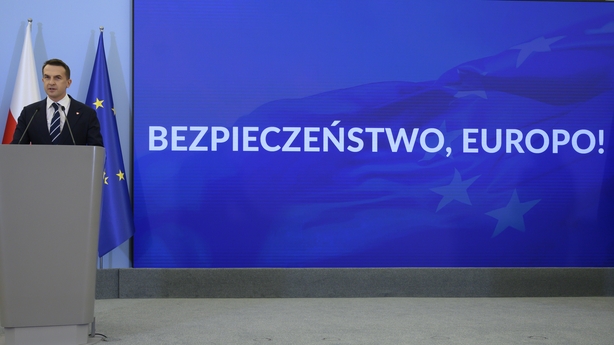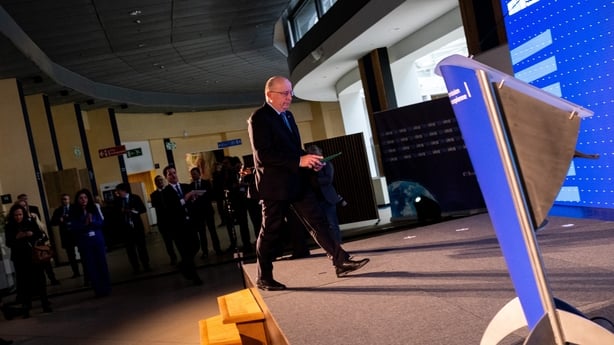Polish and European Union flags flutter from lampposts all along the main road into Warsaw from the city's Chopin airport - a sign that Poland's presidency of the Council of the EU is now under way.
After eight years of disputes between Poland’s previous nationalist government and EU institutions over the rule-of-law and the independence of the Polish judiciary, the current pro-EU government in Warsaw has brought the country back to the centre ground of EU decision-making.
The nationalist rhetoric of the Law and Justice years is out, and calls for European solidarity are in.
"There will be a message of Europe repairing the rule-of-law, championing Poland in Europe, versus a narrative of the former ruling camp that was in opposition to the EU overall on a broad basis," Wojciech Przybylski, editor-in-chief of political publication Visegrad Insight, told RTÉ News.
You don’t need to look far for Poland’s top priority during its six-month term in charge of chairing Council meetings: "Security, Europe!" is the tagline for the Polish presidency.
Calls for stricter controls on irregular migration, which the Polish government says is linked to maintaining national security, comes a close second to defence concerns.
A 50-page document outlining the priorities of the Polish presidency states that Russia’s full-scale invasion of Ukraine poses "an existential threat to Europe, the greatest since the end of the Second World War".
To combat this threat, the EU needs "concerted and ambitious action on European defence, complementing the efforts of NATO", reads the document.
"There is a need to boost defence readiness based on increased military spending, a stronger defence industry and addressing defence capability gaps".
The same document calls for greater debate on defence spending in the EU and for member states to increase defence spending and keep it at "a level appropriate to the threats".

Poland plans to spend 5% of its annual GDP this year on defence, up from just over 4% in 2024 - the largest of all EU member states in percentage terms.
That kind of spending commitment will please US president-elect Donald Trump, who, this week, called on NATO members to spend that same amount - 5% of GDP - on defence needs.
At the other end of the scale is Ireland, which spends 0.2% of GDP on defence, the lowest in the EU.
However, the Government's budget last October allocated €1.35bn to defence funding - a record sum in the history of the State.
It could be argued that the threat posed to Ireland by Russia is significantly lower than that posed to Poland, which shares a border with Ukraine, as well as Moscow’s client-state Belarus and the Russian exclave of Kaliningrad.
Add increased naval patrols by NATO members in the Baltic Sea to guard against potential Russian sabotage squads and it's easy to see why Poland, the three Baltic countries, and Finland perceive "appropriate" threat levels very differently to say, western or southern EU member states.
Polish Prime Minister Donald Tusk set the tone for beefing up defence spending when he told delegates at a European People's Party conference in Bucharest last year that "we now live in a pre-war epoch". It is hard to think of another European leader who has warned of the possibility of a wider war on the continent in such stark terms.
Unlike NATO, and despite calls from Poland for increased military spending, the EU does not, and is very unlikely to, set a target for how much each member state should spend on national defence.
But the EU does have big plans for a much larger defence budget than the €8.5bn sum currently set aside for the bloc’s European Defence Fund for the entirety of the 2021-2027 budget cycle.
Mario Draghi’s report last September on EU competitiveness estimated that the bloc will need to raise €500bn over the next decade to keep its defence industry competitive and in line with demand.
It’s a sum that Andrius Kubilius, the EU’s first defence commissioner, is working towards.
Mr Kubilius, a former Lithuanian prime mine minister, is currently drawing up a White Paper - due to be released in March - that will outline proposals on the future of European defence.
He told an EU committee on foreign affairs last November that any new approach will be "based on joint investments, and readying EU member states for the most extreme military contingencies".
Experts have suggested that the only viable way to quickly raise a huge sum of €500bn is through debt financing, such as issuing bonds.
Other funding methods have been floated by Mr Kubilius.
He told Reuters in an interview last month that defence funds could be raised through the European Stability Mechanism or that money could be redirected from the EU’s pandemic recovery fund.

"Poland would support debt financing and a special fund for defence, and this debate will start under the Polish presidency," said Piotr Buras, who heads the Warsaw office of the European Council on Foreign Relations, a thinktank.
"There is an awareness in EU capitals and institutions that some progress is needed on defence. But it’ll be difficult to achieve any concrete results before the German election," Mr Buras told RTÉ News.
Germany’s federal election is due to take place on 23 February and it's feasible that it could take a couple more months to form a government. That would eat into the final third of Poland's presidency.
Friedrich Merz, whose conservative CDU is leading polls and who could be Germany’s next Chancellor, has expressed more hawkish support for Ukraine than current Chancellor Olaf Scholz, saying he would allow Kyiv to use German-made long-range Taurus missiles.
But debt financing is something that Mr Merz’s party has traditionally been against.
"For Merz, the question is whether debt financing for defence is one-off or permanent. A one-off funding mechanism would be more acceptable to the Germans," said Mr Buras.
Poland's presidency, coupled with the publication of Mr Kubilis's White Paper will kickstart a serious debate on how member states should fund a much bigger and dedicated EU defence budget in the coming decade.
But any concrete decisions on defence funding may only take place when Denmark takes over the presidency in the second half of this year.
At national level, spending on defence has already jumped in most member states.
The European Defence Agency estimates that total expenditure by all EU member states in 2024 was around €326bn, an increase of more than 30% compared to 2021 - the year before Russia launched its full-scale invasion of Ukraine.
Poland's presidency also coincides with the start of discussions on how the EU's next multi-annual budget should be structured.
Warsaw will push for greater spending on defence during those discussions, but economic and energy security, areas that the Polish presidency programme lists as other key priorities, will likely carry more immediate weight across the bloc.
"Economic security with tariffs potentially looming, starting with Trump, with economies failing in a number of countries," said Mr Przybylski, is likely to "dominate the political process and discussion" during this presidency.
"I think the actual deliverables will be around how do we make our economy work".







